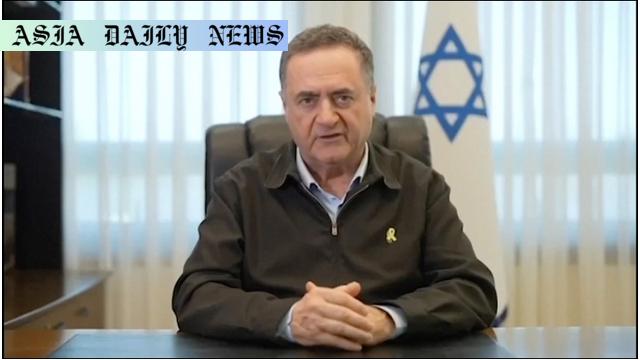Hamas: Israeli Defense urges Gaza residents to demand Hamas’ removal and hostage release to halt the ongoing conflict.
- Israeli minister urges Gaza residents to demand Hamas’ removal.
- 11 Hamas political leaders killed as Israeli offensive escalates.
- Ongoing conflict leads to over 830 deaths reported in Gaza.

The Intensifying Conflict in Gaza
The ongoing conflict in Gaza has reached a critical juncture, with Israeli Defense Minister Israel Katz issuing a charged appeal to the residents of Gaza. In a video statement, he emphasized the necessity of removing Hamas from the region for any cessation of hostilities. With the Israeli military intensifying its operations, Katz underscored the immediate release of all Israeli hostages as a critical step toward ending the war. According to Katz, the military has strategically prepared for enhanced operations, signaling further intensification of the ongoing conflict.
The health authorities in Gaza have reported 830 fatalities since the Israeli forces resumed their offensive on March 18. Thursday marked yet another wave of attacks across Gaza, further aggravating the already precarious living conditions of its residents. As the situation escalates, Israel’s broader strategy appears targeted toward dismantling Hamas’ infrastructure and leadership.
The Decline of Hamas Leadership
The latest reports suggest that Israel’s prolonged military campaign has severely impacted Hamas. The Reuters news agency quoted informed sources stating that 11 out of the 20 senior members of the Hamas political office, the organization’s main decision-making body, have been killed. These targeted strikes indicate Israel’s focused objective of neutralizing Hamas’ leadership, further undermining the organization.
Thursday’s operations were especially significant, as Hamas announced that its spokesperson had been killed in the northern Gaza city of Jabalia. This development is emblematic of the ongoing strain on Hamas amidst the reduced ceasefire discussions and heightened violence. Israel’s approach of zeroing in on key individuals highlights the militaristic and strategic aspects of its campaign.
Civilian Mobilization and Strategic Messaging
In his appeal, Katz called upon the people of Gaza to rise against Hamas. His statement puts forth the idea that a direct civilian appeal against Hamas could serve as a trigger point for broader change in Gaza. However, with the region already grappling with deteriorating humanitarian conditions, the feasibility of such an appeal remains questionable. The Israeli narrative frames Hamas as not only a political threat but also as a barrier to peace, urging civilians to play a role in its removal.
The challenges of implementing this strategy are multifaceted. The social and political dynamics in Gaza are deeply entrenched in years of conflict, and the ability of civilians to broadly voice dissent against Hamas remains limited. Despite these obstacles, Katz’s statement aims to pressure Hamas both internally and externally amidst increasing international scrutiny.
Humanitarian Ramifications of the Intensified Conflict
The war continues to exact a high toll on civilians. The death toll rising to over 830 reflects an alarming upward trajectory in casualties, further aggravating the region’s already dire humanitarian situation. With airstrikes targeting key regions across Gaza, residents are left to contend with the uncertainty of survival amidst failing infrastructure and scarce resources.
The international community has responded with growing urgency, calling for ceasefires and humanitarian assistance. However, diplomatic efforts have been stymied by certain geopolitical complexities, exacerbating the toll on ordinary civilians. Areas such as Jabalia, now devastated due to military campaigns, underscore the urgent need for negotiations amidst rising fatalities.



Commentary
The Role of Leadership in Prolonging Conflict
The ongoing conflict in Gaza raises critical questions about the nature of leadership during times of war. The targeted killing of 11 Hamas political leaders underscores the lengths to which parties are willing to go to achieve their objectives. On one hand, Israel’s actions highlight a calculated military strategy; on the other, they also signify the complexities of eradicating long-entrenched power structures like Hamas.
One must consider the broader implications of such leadership-targeted actions. How does the removal of top decision-makers disrupt the daily operations of Hamas? More importantly, does it create opportunities for genuine peace or pave the way for more resolute opposition? These are questions with no straightforward answers, but ones policymakers must grapple with moving forward.
The Importance of Civilian Agency
Minister Katz’s call for civilian action against Hamas is as bold as it is intriguing. While it may seem like a logical step in eroding Hamas’ power, the practicality of such an appeal remains uncertain. Under immense stress from bombings and restricted freedom, civilians in Gaza face significant obstacles in rallying against their local political structure—especially against a backdrop of societal fear and uncertainty.
The international community, therefore, plays a pivotal role in enabling these voices to emerge. Transparency and humanitarian aid are both critical in empowering civilians; without these, Katz’s appeal may fail to materialize through actionable steps.
The Future of Gaza: A Path Forward
The current state of Gaza reflects years of sustained conflict that needs immediate resolution. Whether achieved through military might, political negotiations, or grassroots advocacy, a long-term solution will necessitate compromise and mutual understanding. The challenge lies in bridging the gaps between the political and humanitarian dimensions of this crisis.
In conclusion, the ongoing conflict demands urgent attention and action from global players. With the present situation placing civilians at increasing risk, creating pathways to peace remains not just a political priority but a moral imperative. As the narrative unfolds, the international community must seize the opportunity to foster dialogue, counter violence, and uphold human dignity in Gaza.